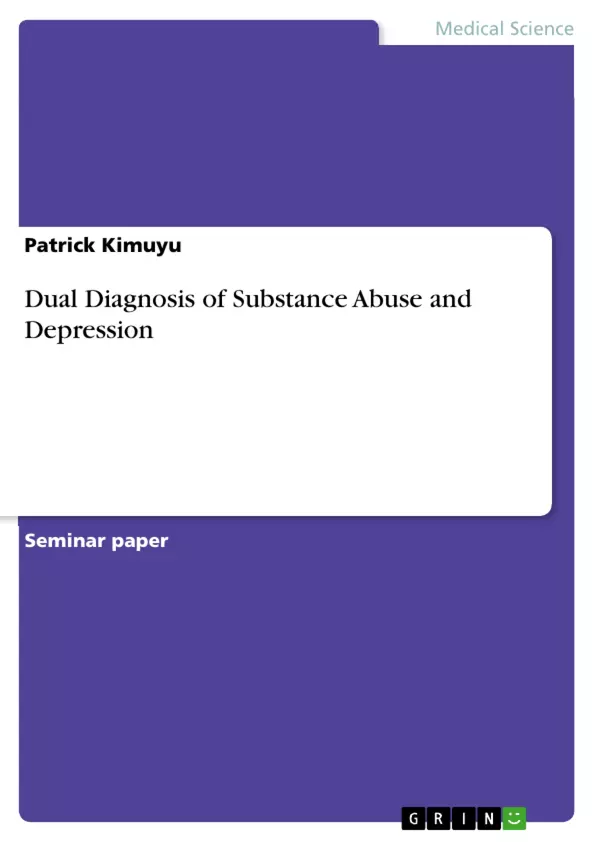Substance abuse and co-occurring disorders are seemingly becoming an enormous challenge to health care systems. Substance abuse has become popular, especially among the young people even though its prevalence appears to be a cross-sectional health issue with drug addiction occurring across all ages and gender. On the other hand, mental illnesses are increasing at an alarming rate among the global population; thus, unprecedented burden to healthcare systems and professionals. Ordinarily, the occurrence of a mental health issue such as depression and a substance abuse problem is what is commonly referred to as dual diagnosis or a co-occurring disorder. From a nursing perspective, dual diagnosis does not appear to be a simple task because it deals with handling two problems concurrently: the mental health problem and the substance abuse issue.
Inhaltsverzeichnis (Table of Contents)
- Mental Health, Dual Diagnosis of Substance Abuse and Depression
- Depression
- Substance Abuse
- Co-occurring Disorders
- Understanding the Nature of Dual Diagnosis
- Mental Health Problems
- Substance Abuse
- Treatment of Dual Diagnosis
Zielsetzung und Themenschwerpunkte (Objectives and Key Themes)
This text aims to provide a comprehensive overview of dual diagnosis, which involves the co-occurrence of substance abuse and mental health disorders, specifically depression. It explores the nature of these disorders, their interactions, and the complexities of their management.
- Understanding the nature of dual diagnosis and its implications for patient care.
- Identifying the symptoms and characteristics of depression and substance abuse.
- Examining the interplay between mental health disorders and substance abuse, including their potential causal relationships.
- Discussing the challenges and approaches to treating co-occurring disorders, emphasizing the importance of integrated treatment.
- Highlighting the need for comprehensive and coordinated care to address the unique needs of individuals with dual diagnosis.
Zusammenfassung der Kapitel (Chapter Summaries)
The text begins by introducing the concept of dual diagnosis, emphasizing the rising prevalence of substance abuse and mental health disorders. It highlights the challenges faced by healthcare professionals in managing these co-occurring conditions.
The following sections delve into the nature of depression and substance abuse, outlining their respective symptoms and identifying common indicators for their presence. The text then explores the complex relationship between these disorders, considering how they might influence each other's development and severity.
The final chapter focuses on treatment approaches for dual diagnosis, emphasizing the importance of integrated care that addresses both mental health and substance abuse issues simultaneously. The text highlights the potential benefits of coordinated treatment and the challenges of fragmented care.
Schlüsselwörter (Keywords)
Key terms and concepts explored in this text include dual diagnosis, co-occurring disorders, substance abuse, depression, mental health, integrated treatment, healthcare systems, patient care, symptoms, interactions, and treatment approaches.
Frequently Asked Questions
What is a "Dual Diagnosis"?
A dual diagnosis, also known as a co-occurring disorder, refers to the condition where an individual suffers from both a mental health disorder (like depression) and a substance abuse problem concurrently.
Why is dual diagnosis difficult to treat?
It is challenging because healthcare professionals must address two complex issues simultaneously, as the mental health problem and substance abuse often influence and worsen each other.
What are common symptoms of depression in this context?
Symptoms include persistent sadness, loss of interest, fatigue, and changes in sleep or appetite, which may be masked or exacerbated by drug use.
What is "integrated treatment"?
Integrated treatment is an approach where both the mental illness and the substance use disorder are treated by the same team or in a coordinated manner at the same time.
How common is substance abuse among young people?
The text notes that substance abuse has become very popular among young people, though it remains a cross-sectional health issue affecting all ages and genders.
- Arbeit zitieren
- Patrick Kimuyu (Autor:in), 2016, Dual Diagnosis of Substance Abuse and Depression, München, GRIN Verlag, https://www.grin.com/document/381226



